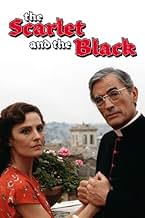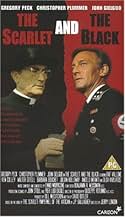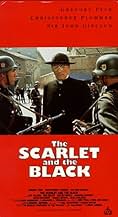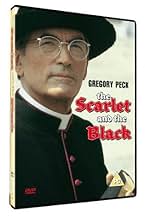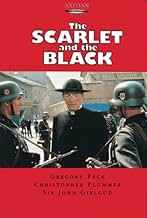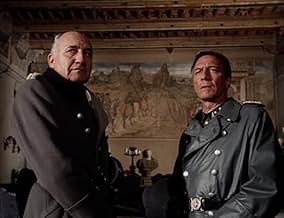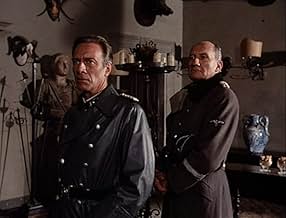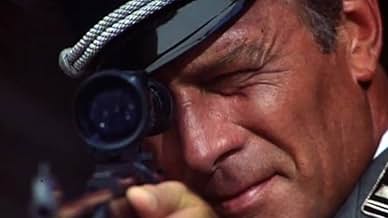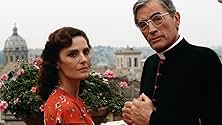1943, Le pape Pie XII ne prend pas part au conflit qui déchire l'Europe. Or Monseigneur O'Flaherty, use de son immunité diplomatique pour cacher des prisonniers de guerre. Le colonel Kappler... Tout lire1943, Le pape Pie XII ne prend pas part au conflit qui déchire l'Europe. Or Monseigneur O'Flaherty, use de son immunité diplomatique pour cacher des prisonniers de guerre. Le colonel Kappler, chef de la Gestapo de Rome, le soupçonne.1943, Le pape Pie XII ne prend pas part au conflit qui déchire l'Europe. Or Monseigneur O'Flaherty, use de son immunité diplomatique pour cacher des prisonniers de guerre. Le colonel Kappler, chef de la Gestapo de Rome, le soupçonne.
- Réalisation
- Scénario
- Casting principal
- Récompensé par 1 Primetime Emmy
- 1 victoire et 2 nominations au total
- Pope Pius XII
- (as Sir John Gielgud)
- Capt. Hirsch
- (as Ken Colley)
Avis à la une
John Gielgud makes a very convincing Pope Pius XII. Sir John aged very gracefully giving him that perpetual angelic half smile on that kind face. Contrast this to the fact that we remember him well as the blackguard Casca in Julius Caesar (with James Mason and Marlon Brando). As Pius XII, Gielgud portrays the late Pope as torn between his duty to ensure the safety of the Church and Catholics and the necessity of actively participating in rescuing the Jews of Europe lest that provoke the Nazis towards more brutalities. The recently released Actes et Documents du Saint Siege relatiffs a la Guerre Mondiale Seconde (Acts and Documents of the Holy See relative to WWII or ADSS) reveal that the Holy See saw a relation between increased persecution of both Jews and Catholics, especially the religious orders, every time Pius XII spoke against the Nazis. It also disclosed that Jewish leaders, both in and out of Nazi Germany, advised the Pope to speak and act more discreetly because of this.
Gregory Peck is, as usual, dignified, likable and very convincing as a brave Catholic monsignor. An interesting political sidelight in the movie concerned Flaherty saving some British Tommies stranded behind enemy lines in Italy. One of them obviously not one fond of the Irish, upon hearing Flaherty's Celtic brogue exclaimed that he was Irish. Flaherty's response was to the effect, that he may not like what the British were doing in Ireland but it was still his Christian duty to help them. Remember, at the time Southern Ireland was still under British rule under very repressive conditions (cf. Leon Uris' book, Trinity).
If you liked movies of this genre you should also see Portrait : A Man Whose Name was John which starred Raymond Burr as the Papal Nuncio in Turkey, Msgr. Roncalli, the future Pope John XXIII who used his position and his chancery to save thousands of Jews escaping from Nazi-occupied Hungary. Other Hollywood films which treated the Church kindly if not sympathetically are: The Shoes of the Fisherman (Anthony Quinn) and The Cardinal (Tom Tryon).
This is the true story of a man whose conscience will not let him stand by while the world goes to hell around him. Gregory Peck plays an O'Flaherty whose quaint 'Oirish' charm hides a cunning and resourceful leader who has to balance the demands of his conscience with his role as an official in the Vatican government.
Pope Pius makes it clear he understands O'Flaherty's motivation while warning him that if he is arrested, the Pope will not compromise Vatican neutrality to save him. The film does its best to restore Pius XII's reputation - he has been called "Hitler's Pope" - but it is unclear how much he knew of, or even condoned, O'Flaherty's activities. O'Flaherty cannot compromise, and continues with his work despite the Gestapo having orders to shoot him on sight if he is found outside the Vatican, and suffering a failed assassination attempt in St Peter's itself.
Christopher Plummer is always worth watching and his performance here is no exception. Shown first as an arrogant man who feels the Nazis now "own Rome... it's ours", we later see that Kappler is at the mercy of this ruthless regime even as he plays his part in it. Finally the only person he can turn to is his arch-enemy from the Vatican. This is a fairly conventional irony, but during the course of the film Plummer also suggests how Kappler is losing his soul to his inhuman work, becoming isolated from his family as he begins to loathe what he is doing. You feel Kappler hates O'Flaherty not simply because of what he does, but because O'Flaherty represents the better part of himself.
I would give the film more stars but it is about 15 minutes too long and becomes rather episodic towards the end. However, it's a great story, well-acted by a strong cast, and can be viewed and enjoyed many times.
Although Monsignor Hugh O'Flaherty, an Irish national attached to the Vatican staff, was providing aid to refugees of all kinds from the Nazis before, this film covers a period between September of 1943 and June 5, 1944 when Mark Clark and the Fifth American Army liberated Rome.
Gregory Peck plays the resourceful monsignor who's got a whole bag of tricks from the land of leprechauns to outwit the Nazis. He develops quite a network of people who house escaped prisoners. When Italy threw out Mussolini and switched sides in World War II, a whole lot of Allied prisoners were freed and roaming the countryside. You might remember the novel and film Von Ryan's Express which detailed that phenomenon. The word got out if you could make your way to the Vatican, Monsignor O'Flaherty could help.
What I like about The Scarlet and the Black is the fact that Peck's chief antagonist Christopher Plummer is shown as a three dimensional character. We see him as the ruthless Nazi who dogs Peck and his operation every step of the way. We also see him as father and husband who's enjoying Christmas in Rome with his family and also acting like any other tourist taking the family to see the sights of the Eternal City.
Peck and Plummer are a pair of well matched antagonists. Presiding over it all is John Gielgud as Pius XII. The criticisms I have of Pius occur before he reached the Papacy in 1939. At the point in time that The Scarlet and Black is taking place, there was very little he or anyone else as Pope could have done. He feared, probably with good reason, an Avignon captivity situation for the Papacy if he appeared to be overtly pro-Ally. And of course the Soviet Union which was his big fear was an Ally.
I would recommend watching this film about a good man who happened to be a priest who stepped up to the plate when no one would and fulfilled a great need. A whole lot of lives were saved because of him.
The book is entitled "The Scarlet Pimpernel of the Vatican," by J. P. Gallagher. It is the story of Irish Monsignor Hugh O'Flaherty who was a minor Vatican official during World War II. Right under the noses of Vatican officials who looked the other way, and the German army, he helped smuggle allied soldiers out of Rome to safety in the months before the liberation of Rome. Rome and the Vatican were supposed to be neutral; if the Germans found out that the monsignor was helping the allies, who knows what would have happened.
I was able to find a copy of the book several years ago but have lost it. I do recall though that it had even more incredible stories about how O'Flaherty helped allied soldiers. One of the best (that is not in the movie) was about one American soldier whose appendix burst and he needed it removed. O'Flaherty dressed him as a German soldier, called the German army, they came and took him to their hospital - and O'Flaherty managed to get the soldier out before he even woke up because of the general confusion in the military hospital.
The Scarlett Pimpernel reference, is of course, to the British spy who helped save people from being beheaded during the French Revolution. That's another good book and the movie, with Anthony Andrews and Jane Seymour, are both excellent (though the movie changed the ending...).
Le saviez-vous
- AnecdotesWhile serving his sentence in prison, Herbert Kappler divorced his first wife and married his nurse, Anneliese, in 1972. In 1975, he was diagnosed with cancer. As the authorities refused to release him, in 1977, Anneliese carried Kappler out of prison in a large suitcase (he weighed less than one hundred five pounds at the time). They escaped to West Germany, where Kappler died six months later.
- GaffesIn at least four scenes, Herbert Kappler wears a black SS parade tunic instead of his usual office gray uniform. By 1943, when the film is set, the SS had completely phased the black SS tunic out of service and this uniform would not have been worn at even the most formal of functions.
- Citations
Col. Herbert Kappler: You're alone?
Monsignor Hugh O'Flaherty: I am.
Col. Herbert Kappler: Not afraid I'll shoot you?
Monsignor Hugh O'Flaherty: No. If you were going to kill me, your man would have already done it in my room.
Col. Herbert Kappler: That is so.
[pause]
Col. Herbert Kappler: But believe me, at this moment, nothing would give me greater pleasure.
Monsignor Hugh O'Flaherty: Well, when it comes down to it, a bullet's your answer to just about everything, isn't it? The only argument you've got.
- Versions alternativesAn edited version of approximately 110 minutes (120 minutes when broadcast with adverts) is sometimes shown on TV in the UK.
- ConnexionsReferences Représailles (1973)
- Bandes originalesLa Boheme
Composed by Giacomo Puccini
Meilleurs choix
Détails
- Date de sortie
- Pays d’origine
- Langues
- Aussi connu sous le nom de
- Le pourpre et le noir
- Lieux de tournage
- Sociétés de production
- Voir plus de crédits d'entreprise sur IMDbPro

